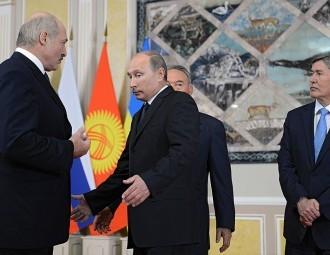Lukashenka: We should renew talks on the Eurasian Economic Union in about ten years

Belarusan leader insists on the abolishment of restrictions in commodity movement now.
“There are fears that economic difficulties might arise. We are fully aware of that, but otherwise we should speak about the Eurasian Economic Union in ten years, too,” ITAR-TASS quotes Aliaksandr Lukashenka saying so at the meeting of the Eurasian Economic Council on April 29 in Minsk.
As “EuroBelarus” Information Service has earlier reported, on April 29 the Supreme Eurasian Economic Council summit took place in Minsk.
At the meeting the Belarusan President said that “the Eurasian Economic Union Treaty will be signed very soon, so the question is what we will have by the time of signing. Some say we should leave unsettled the problem we should have solved at previous stages.”
In his words, the current agenda should include concrete landmark stages, the first of which was the formation of the full-format Customs Union. Member states of such Union, in his words, should have no restrictions in commodity movement. If any commodity restrictions, especially applicable to fuels, were preserved for a long time, it would create undesired precedents, he said. “Approaches stated in the process of negotiations give rise to numerous questions,” Lukashenka noted. “Proposals concerning the deadlines of the implementation of agreements in ten years, or by 2025, sound at least strange.”
According to the Belarusian leader, if the sides were not ready to take corresponding measures now, this fact should be openly recognized. “There are fears that economic difficulties might arise. We are fully aware of that, but otherwise we should speak about the Eurasian Economic Union in ten years, too,” he said.
-
03.01
-
07.10
-
22.09
-
17.08
-
12.08
-
30.09








































